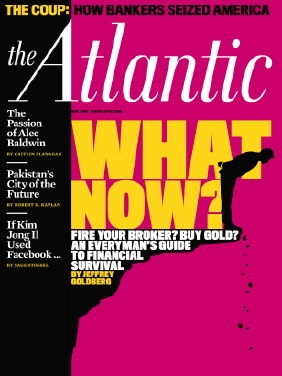Atlantic Monthly Cover Story: Why I Fired My Broker

Entertaining and funny story headlining this month’s Atlantic Monthly, “Why I Fired My Broker”, exploring a question that many middle/upper class Americans are asking themselves these days: Should I fire my broker/financial advisor? Where can I get good financial advice?
The author talks to a number of prominent players inside the financial industry and a “survivalist” near Prescott, Ariz. My favorite quote:
We’re in a strange moment in American history when a mouse eating barefoot survivalist in the mountains of Arizona makes more sense than the chief investment strategist of Merrill Lynch.
The survivalist, a guy named Cody Lundin, actually has some interesting things to say. Here’s his basic investment philosophy:
I don’t believe in the intangible economy; I believe in the tangible economy. When I have extra money, I buy tools, food, or land. I like to be able to see what I’m buying.
In the accompanying video, Goldberg, the author, addresses the question of what’s available to middle class Americans as far as investment advice (1:40-2:00 in the video):
So what you’re left with are these Jiffy Lube kind of places. They’ll take your money. They’ll invest it in the same things that everybody else is being invested in.
The author also talks to famed hedge fund manager Seth Klarman who says the same thing about your average investment advisor:
There’s enormous pressure to provide conventional advice and tremendous pressure against providing unconventional advice. Advisers only recommend what’s conventionally palatable. They tend to say 60 percent stocks, 40 percent bonds, and they’re not likely to move away from that, no matter how extreme valuations are. They’re not likely to move away from it when the market is really high, or really low.
The author’s feelings about that are as follows:
Unconventionality makes me nervous, but less so than conformity. I’m finished with conformity. In picking an adviser, I’m also looking for someone who is unleveraged; someone who is putting his own money into the investments he’s recommending; and someone who can explain to me in a few sentences, in language easily understood by earthlings, his philosophy of investing.
The investment advice business is littered with charlatans and mediocrities. It’s a mine field for the average investor to find somebody good and avoid somebody bad – without learning the hard way. Many Americans are wrestling with these issues at the moment. I wish them the best of luck!
